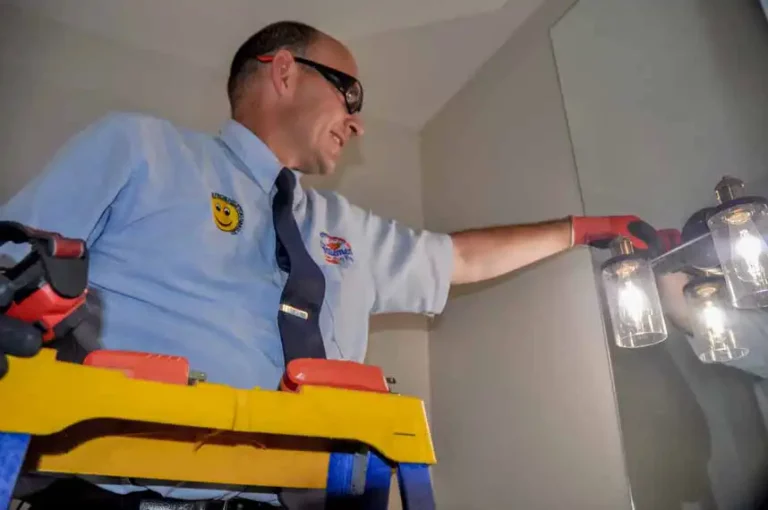
Same Day Service
Since 2001
Call The Gentleman Pros Now!
(403) 879-1759

“The gentleman pros were awesome to deal with. Our technician Stanley was very professional and friendly and went above and beyond to ensure we were completely satisfied with his work. He originally came to replace a burnt out pot light and switch out 3 light switches for dimmers and during the visit I asked if he could install 3 more motion sensors and another dimmer. He had no problems with completing the extra work and was very thorough in explaining all the work he did. Would recommend the gentleman pros to anyone looking for any electrical work they need. 10/10 for customer service and overall satisfaction with a job well done!!! “ Justin R

When you need lights, you flip a switch so electricity will power your light fixtures. When you need electricity to power a device, you plug the device into an outlet. But what if the switch or outlet doesn’t work? Or if you don’t have a switch or outlet where you need one?
Well, you give Calgary Gentlemen Pros a call. From the simple to the complex, our qualified and knowledgeable electricians can tackle all of your outlet and switch needs. We can troubleshoot any problems you are having with your current outlets and switches. And if you need new ones installed, we can do that too.
Your home and family are of the utmost importance to you and we understand. We make sure we hire only trustworthy people, who happen to be excellent electricians. All our electricians are licensed, insured, and bonded for your protection. We also invest in ongoing learning to keep abreast of regulations and best practices. You will always get our best!
Book an electrician now. Call (403) 879-1759 and talk to one of our friendly customer service agents. You can also reach out online by clicking the Chat With Us button at the bottom of the page or by scheduling a service online.
We are waiting to make you smile!
An electrical inspection and testing help determine if your electrical system and its parts (fixtures, outlets, switches, etc.) are safe for use.
If you aren’t sure you need an electrical inspection, here are some great reasons:
Our skilled electricians will carry out a set of procedures and look at every single piece of your electrical system. We even conduct a thermal scan looking for hotspots. This is very important because a majority of house fires are caused by an electrical malfunction or failure.
Once the safety inspection and testing are complete, our professional electricians will review and explain their findings and recommendations to you. Don’t worry we will answer every question you have.
To book an electrical safety inspection and testing you have three options:
Yes, there are several types of outlets (also called receptacles). In fact, there are enough outlets that we have two posts about them. And each type of outlet serves a different purpose.
When you plug a device into an outlet, the device becomes part of the electrical circuit, and electricity is delivered to operate the device.
A quick explanation before we get into the different types of outlets. You will notice that most residential outlets are rated for either 125 V or 250 V. This is confusing because the circuits in your home only deliver either 120 V or 240 V of electricity.
The outlet’s rating is not an indicator of the amount of voltage it supplies. The amount of voltage that actually comes out of the outlet is determined by your home’s electrical service (120 V or 240 V). However, the electrical service fluctuates. It isn’t a constant 120 V or 240 V.
The rating shows the amount of voltage the outlet and its components have been designed to safely handle. They are designed to safely handle more than 120 V or 240 V because the voltage fluctuates and can sometimes be higher than 120 V or 240 V.
These outlets are the original outlets and have gone the way of the dinosaurs. That is because they are ungrounded outlets which makes them unsafe compared to three-pronged outlets.
One hole is the hot connection and the other is the neutral connection. When the two prongs on the plug are inserted into the holes, they complete the circuit letting electricity flow to the device.
However, two-pronged outlets are missing the third hole which is the ground connection. Because these outlets do not have a ground connection, they are unsafe.
Two-pronged outlets have not been allowed by the Canadian Electrical Code since the early 1960s. If your home has mostly two-pronged outlets, please contact an electrician.
Three-pronged outlets are the most common outlet in households. They are the only outlet allowed by many electrical codes and the remaining outlets on this list are just a version of a three-pronged grounded outlet.
The top two slots work the same as a two-pronged outlet, but the third slot is the ground connection. It connects the device’s ground to the house’s electrical circuit’s grounding system.
What exactly does “ground” mean? Your house’s grounding system is a safety system. It gives electricity that has left the designed circuit a safe path to return to its source. The source is most commonly the electrical grid, but occasionally it is the ground which is where the name comes from.
Without a grounding system, electricity will use any conductive material to get back to its source. And that includes you and your pets. Also, electricity can generate heat. When the electricity is moving outside the designed circuit, the generated heat can ignite materials near the path it is taking. Your electrical circuit, including the grounding system, is designed so this won’t happen, so you always want your electricity to travel within it.
This is your outlet for standard use. You can plug in all your standard household devices.
This outlet is used for appliances that need a little more amperage. Items like your washing machine, dishwasher, and fridge. They are also recommended for some of your larger kitchen gadgets. For example, microwaves, mixers, and blenders.
The slots do vary slightly from the 15 amp, 125 V outlets. One of the slots is often a t-shaped or horizontal slot. This is to help prevent people from plugging in the wrong type of device or appliance.
A 250 V outlet looks very similar to a 120 V outlet, but it delivers a higher voltage. These are used for appliances that require more power to operate. Appliances like your laundry machines and air conditioners. These outlets are often on their own circuit.
Their slots are typically horizontal to help stop the wrong type of appliance from being plugged into them.
250 V outlets do come in amperages higher than 20 amps. Make sure you are using the correct amperage and voltage for the device you want to plug into the outlet.
Tamper-resistant outlets help stop electrical shocks by preventing people (well mostly young children) from inserting foreign objects into the outlet. Little ones are curious and when they see a hole, they want to put something in it. This can have dire consequences for a child when they put something in an electrical outlet that doesn’t belong there.
These receptacles have a built-in barrier, a shutter system, that stops objects from being pushed into them. The shutters only open when even pressure is applied to all the slots simultaneously like when you push in a plug.
Please remember these are not foolproof. Keep an eye on your young ones around electrical outlets and cords.
For information on other outlets, please check out Part 2.



